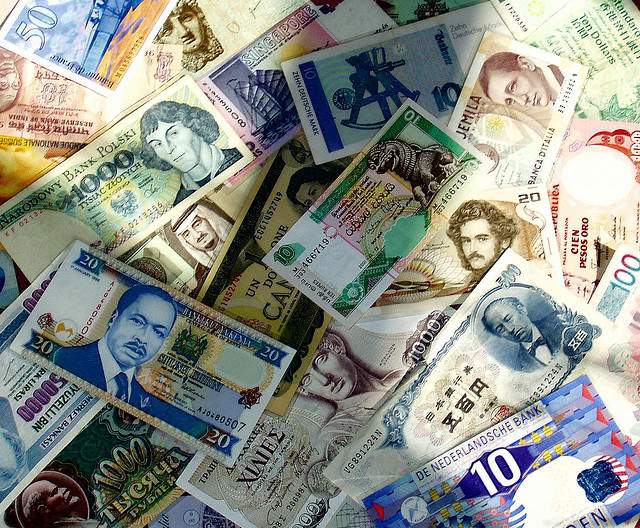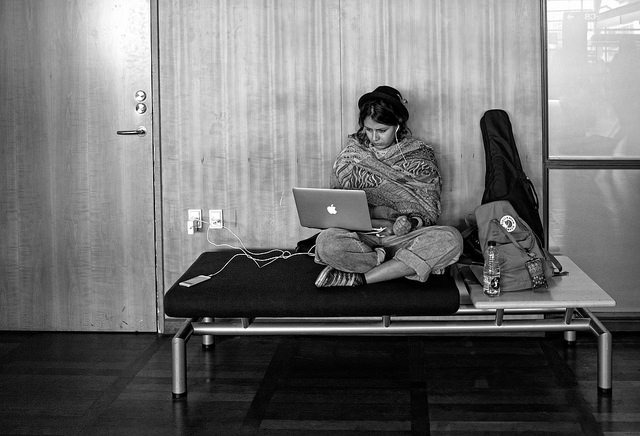When I tell people I’m a travel blogger, I know that they’re usually picturing me reclining beside a pool on a sun lounger: mai tai in one hand, the other idly tapping away at a laptop keyboard. Working for an hour or so before heading off to the beach, staying in five star hotels, eating in amazing restaurants every night.
It’s a dream career, so it’s hard for people to picture anything other than a dream.
But the reality can be less tempting: a manic rush to squeeze twenty tourist attractions and hip new bars into one weekend, followed by an all-nighter desperately typing up the findings ready for a Monday morning deadline.
Travel Blogging, at least serious, full-time travel blogging aimed at making money, tends to be a lot of work and not much travel. That being said, there can be perks – like press trips, free gifts, hotel reviews, or complimentary spa treatments and meals. But blogging is also a lot of hard work, and a huge demand on your time, without much chance of making it.
There have been plenty of articles written about using blogging while travelling to earn enough of an income to offset travel costs, but what about a full time career?
There have been plenty of articles written about using blogging while travelling to earn enough of an income to offset travel costs, but what about a full time career? Many travel bloggers out there are earning a full time wage from blogging, but for most it’s just a hobby income or a way to cover the cost of a round the world trip.
Is it possible to earn a living from travel blogging alone, while paying rent or a mortgage and bills in a Western country, starting a family, and paying a pension?
Or is this just a temporary job to cover a life of travel, until the gap year ends and “real life” starts?
As a blogger trying to make it full time, I certainly hope it’s the former rather than the latter, but at this stage it’s hard to tell. So I’ve interviewed a number of travel bloggers making money from their work, from those just starting out to the well established, to find out if this really is a feasible career option.
How long will it take?

Any travel blogger you speak to will tell you exactly what no one wants to hear when just starting out. It will be a very long time before you start making any money from blogging, and even longer before you come anywhere close to a livable income. Laura from What About Her has been blogging for eight years but was only able to go full time a year ago. The length of time it takes to “make it” also depends on how much work you put in to building a successful blog.
It will be a very long time before you start making any money from blogging, and even longer before you come anywhere close to a livable income.
Tips on getting started
- Build up a strong, definable audience and a large following by creating content that people will be interested in
- Use social media and networking to engage new readers.
- Increase your site statistics like daily/monthly unique visitors, which again means you need to create content people will be interested in and promote it as many ways as possible.
- Build your Google Page Rank, which means getting other sites to link to your blog, usually by doing things like guest post exchanges or link swaps with other bloggers.
Once you have a well produced blog, with lots of engaging content, a strong following and a reasonable Google PR (I found that I didn’t start making money until I was at PR2), you may be able to start earning an income from your blog.
“My website brings me a fair income now because I treat it as a business and have diversified it into a range of different income streams, using my blog as a brand to tie them all together. It took a long time and a lot of hours every week to even start earning money on my blog. If you want to earn money you have to be prepared to put in the hours, work full time at it, and treat it as a business. If you do, the rewards will come eventually.” Mike Huxley, Bemused Backpacker.
How can your travel blog generate an income?

There are a lot of ways that a blog can generate an income, and there are many differing schools of thought regarding which is the best option. It all comes down to what works for you and your blog.
Affiliate Marketing – Easy to run, but not often a huge earner, affiliate links are coded hyperlinks which earn you a small commission every time someone clicks them and buys something. The downside? You won’t start earning much, if anything, until you have been blogging a long time and have established yourself as an expert on a given topic.
Sponsored Content – Companies will often sponsor bloggers to host guest posts about their product/services, text links within articles or side-bars, or to write posts/reviews about their company. The downside? Sponsorship is sporadic, fickle, and pretty hard to generate yourself, and if you don’t do it right, you can get punished by google.
Banner Adverts – Image-based adverts which can be featured in the sidebars, header, or footer of your website. The downside? These can look ugly and make your site messy if you include too many.
These three options alone are rarely enough, so many travel bloggers supplement their blog income with additional earners like:
Freelance writing – for other blogs, online publications, magazines, newspapers, trade journals, guidebooks, and anyone else you can pitch to.
Photography – If you’re a great photographer, as well as a writer, you may be able to sell the images from your travels, either as souvenirs or to tourism boards, image stocks, or travel companies.
Ebooks – Many writers use their blogs, once established, to launch, promote, and sell an ebook, whether its a guide of some sort or a travelogue.
Once you’ve been blogging a long time, you may become an expert on the subject of blogging itself, and this is another way to make money:
Consulting – Kate, from Adventurous Kate, says she also does consulting in three areas: blogging, travel, and social media. “I help bloggers build better blogs, I help readers plan their travels, and I help small businesses manage their social media.”
Editorial, Proofreading, and Web Design – Lucy Dodsworth, the blogger behind On The Luce, also runs a full time business offering freelance editorial, proofreading, and design services.
“I don’t think there is just one correct way to monetize a blog. There are actually a handful of ways to do it. It’s just about finding one that works best for you and your blog.” Yeison and Samantha, My Tan Feet.
What is the workload like?

“Know this: making a full-time living as a travel blogger is an extraordinarily difficult thing to do. This is in no way passive income — it requires an immense amount of time, work, and networking.” Kate, Adventurous Kate.
Unfortunately, becoming a successful travel blogger isn’t just about writing great stories or travel articles. There is a whole lot more work than that involved. Many full-time travel bloggers put in at least 30 hours a week, while some say they work as many as 70 hours some weeks. It’s a full time job like any other, and if you only put in part time hours, you’ll only receive part time wages.
It’s a full time job like any other, and if you only put in part time hours, you’ll only receive part time wages.
When you’re travelling, a part time wage can be enough to survive, especially if you’re backpacking on a budget. While I was in South America this year, I put in about two or three days work per week on average and earned between $500 and $1000 a month – which was a fairly decent wage in Bolivia, but which wouldn’t even cover my rent in London.
In the UK, I work on the blog at least six hours a day, six days a week. But I also check my social media, emails, and blog stats on my phone throughout the day, starting before I even get out of bed and right up until I’m brushing my teeth at night, even on days off. I never fully stop working. It’s hard work, but I’m committed to the job and determined to make a career out of this.
Yeison and Samantha, the bloggers behind MyTan Feet, say they put in anywhere from 40-70 hours each, every week, while Jules and Christina of Don’t Forget to Move work about 20 hours a week between them. At the moment, My Tan Feet is making considerably more money than Don’t forget to Move (you can check out their profiles in the next section for more details).
What work is involved?

To keep your readers interested and keep your blog running, most people agree that you’ll need to post an article at least every other day. I try to post five days a week, and this keeps things ticking over nicely and draws in plenty of new readers.
To become successful, though, you also need to concentrate on a whole load of other stuff. You need to improve your Google Page Rank, which means getting other sites to link back to yours – usually by writing guest posts. It’s time consuming to write posts completely for free, just to get your website mentioned on other sites, and when you’re already trying to come up with five posts a week for your own blog, it can be really tough to force yourself to write for others.
As travel writer Tim Leffel says, travel writing, “at least until you’re established, is 90 percent marketing, ten percent writing”, and blogging is no exception.
Besides writing, you also have to use social media to draw in new followers, publicize new blog content, and network with PR companies, other bloggers, and your existing fans and followers. Most bloggers use at least Twitter, Facebook and Instagram – but Pinterest, StumbleUpon and Tumblr, among many others, are also really useful for driving new traffic.
It’s also important to visit and comment on other popular blogs, to make a name for yourself in the travel blogging circle. On top of that, you should try to become better known in the travel world by making appearances and networking at any travel fairs or press events you can get invited to, like the annual Travel Blogger Exchange. As travel writer Tim Leffel says, travel writing, “at least until you’re established, is 90 percent marketing, ten percent writing”, and blogging is no exception.
Then, there’s the general admin. I spend about an hour a day answering emails, as well as contacting PR companies when I’m visiting a new place. There are comments on your own blog and private messages on social media, which all need to be replied to if you want to engage your readers. Finally, I find that I’m constantly tweaking my site, whether it’s changing the layout, updating an old post, removing things that no one reads any more or removing old links. There’s always something to keep me busy.
“You have to enjoy blogging as a hobby before turning it into a business or you’ll just get frustrated and burn out.” Christina, Don’t Forget to Move
Four blogging case studies

“Blogging income is a fickle thing, and it hasn’t been a constant stream. A lot of it depends on how much work you put in personally. Some months are better than others since opportunities just come up randomly sometimes!” Yeison and Samantha, MyTanFeet
Blog earnings depend on a variety of factors, including your site stats, like unique monthly views and Google PR, the budget and size of the clients you work with, your blog’s topic and angle, and simply how much work you put in every month. The more followers and traffic your site has, the more money you can expect – usually. Here are a few profiles from bloggers making money from their site, to give you an idea of what to expect, and when. But remember, it all depends on you.
Jules and Christina – Don’t Forget to Move
- Jules and Christina are currently living in Melbourne while saving for their next trip.
- They’ve been blogging for a year and a half, and put in about 20 hours per week between them.
- Don’t Forget to Move has around 10,000 followers across social media and Google PR 2.
- Jules and Christina have just started to monetize their blog with a couple of sponsored posts and still work full time at the moment.
- Their goal with blogging is to subsidize their travels rather than pursue careers as bloggers.
Emily Luxton – Emily Luxton Travel Blog and Backpack South America
- I’m currently living in the UK, where I’m housesitting to avoid paying rent while blogging and writing full time.
- I’ve been blogging for two and a half years and started making a small income from my main blog about 18 months ago. I put in at least 35 hours every week when I’m not traveling.
- Emily Luxton Travel Blog has over 7,500 followers and email subscribers, Google PR 2 and receives 9-10,000 views per month.
- My income, which comes almost entirely from sponsored posts and banner ads on my blog, as well as some affiliate links, has varied from $500 to $2,200 a month over the last six months or so.
- My goal now is to use my blog to launch a career as a freelance writer, so that between the two blogs and regular writing assignments I can support myself full time while living in the UK.
Yeison and Samantha – My Tan Feet
- Yeison and Samantha are currently travelling in South East Asia, but until last month they were living in Costa Rica.
- They’ve been blogging for about 16 months and work full time on My Tan Feet, usually between 40-70 hours a week.
- My Tan Feet has Google PR 3, over 11,000 followers across Twitter and Facebook, and received over 20,000 unique visitors in September 2014.
- Yeison and Samantha have been earning between $1500 and $3000 a month over the last three months, almost entirely through blogging – although a small amount of that income is also from freelance projects like web design and copywriting.
Note: My Tan Feet publishes an earnings report every month with commentary. This is a really helpful resource for any bloggers looking to monetize their blog.
Laura – What About Her
- Laura is based in The Netherlands, but travels the whole world – taking around two trips every month.
- She has been blogging for eight years now and has been doing it full time for a year.
- What About Her has over 6,000 followers across social media, Google PR 1, and receives 100,000 unique visitors a month.
- Laura is one of the few bloggers I know earning enough from blogging to be able to do it full time while living in a European country.
- Her income comes not just from the blog but also campaigns, paid videos, photography, writing assignments, trips, advertorials, brand campaigns, destination marketing plans and consultancy.
As you can see, all blogs and bloggers are different, and there is no particular statistic which, once reached, will guarantee an income. A high Google PR doesn’t guarantee advertising, while a low one won’t necessarily prevent it. All the stats are important, but I would say that one of the key things to concentrate on is unique visitor,; which means filling your blog with high-quality content that is both well written and interesting, covering trending topics as they come up, and constantly promoting your posts.
Most bloggers supplement their income with an additional income, something which suits them and which, preferably, only they can offer.
All the individual factors above are what combine to create a successful blog, not only site statistics, but also the amount of hours a blogger works, and what other projects they take on. Most bloggers supplement their income with an additional income, something which suits them and which, preferably, only they can offer.
Advice from the experts

“You can definitely earn a full time income from your website, but it totally depends what you do with it. You can’t just write yet another personal travelogue and say ‘this is me and look at where I am going’ and expect the pounds and dollars to roll in. It doesn’t happen. Do something unique, give your audience something useful, something they need, and above all else, diversify.” Mike Huxley, Bemused Backpacker.
“These days there is a massive number of travel bloggers, and it’s growing everyday. You need an angle that makes you stand out. Otherwise, just be happy using blogging to subsidize your travels and use it to find other work like freelancing writing, photography, or design.” Christina, Don’t Forget to Move.
Creating a brand, rather than a blog, is invaluable.
“I think that to make enough income from just your travel blog alone is quite difficult, but you can make enough money from the various opportunities that have come from your travel blog. As you learn more about the blogging world, you get exposed to many things on the Internet and about how making money online really works. You also get to meet a lot of new people, which also opens up new doors.” Yeison and Samantha, MyTanFeet.
“I think it is possible to earn money from your blog (because I am), but it takes lots of time and effort. I’ve been blogging for years and years… You need to collaborate with brands, being an influencer.” Laura, What About Her.
I think that to make enough income from just your travel blog alone is quite difficult, but you can make enough money from the various opportunities that have come from your travel blog.
My advice? Consider everything with a lot of foresight when just starting out. It’s too late for me to change my site name and URL without losing all my hard work and regular traffic, so I wish I’d come up with something more brandable than just my name. The most successful blogs have a more specific angle than general travel, so whatever your expertise is – budget travel, traveling as a couple, a female solo traveler – use that to create a brand for your blog, then choose your design, layout and content to support that. Creating a brand, rather than a blog, is invaluable.
Can you earn a full time living from your blog?

Unfortunately, the answer is a rather complicated yes and no.
Yes, you can earn a full time living from blogging, one which can even support you living in a western country – while travelling a lot. But it isn’t easy, and it seems that virtually no one is earning their full income from blogging alone.
A travel blog can be a great source of income in itself, and more importantly it can also be a platform for starting other projects like freelance travel writing, photography, selling an eBook, consulting, proofreading, translating, design, teaching – the possibilities are almost endless. So yes, it is possible to make a decent living entirely online, and while this may not just be directly through your blog, many bloggers rely on their blog to generate the additional work that forms a big chunk of their earnings.
All that being said, most travel bloggers will probably only ever earn enough to support a life of full time travel, or a stint living abroad in a country with a lower cost of living, until they come back to the real world. Even if that is all your blog turns out to be, that’s still a fantastic achievement. Even in low-cost countries, travel is still a very expensive way of life, so if you can earn a large enough income to support yourself while on the road, that’s really good news.
Once your travels are over – and I’m sorry to say that they probably will be, eventually – if you’ve been working hard at your blog, you may well find yourself in a very good position to launch an exciting new freelance career, as long as you’re open to hard work and ready to adapt to the newest ways of building your audience and earning money. It’s a demanding career, but very rewarding to those who truly love travel blogging.
Are you a travel blogger? Do you hope to become one? How does this article resonate with you? Comment below to share your thoughts and expertise.
Photo credits: Anne Worner, Ritesh Nayak, marco monetti, john.schultz, Earl, CollegeDegrees360, Aaron Jacobs